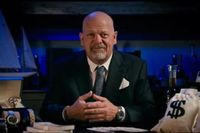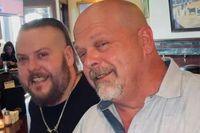In January 2024, Rick Harrison, the well-known host of the History Channel's "El Precio de la Historia" (Pawn Stars), faced an unimaginable tragedy: the death of his 39-year-old son, Adam. This shocking event has profoundly affected Harrison, who admits that he thinks about his son every day.
During an emotional interview with Graham Bensinger for his podcast, Rick Harrison opened up about the painful journey of his son, who struggled with addiction throughout his twenties. Despite Rick's numerous efforts to help Adam, including multiple stints in rehabilitation, it ultimately wasn't enough to save him. Tragically, Adam's life ended due to an overdose of fentanyl, a synthetic opioid reported to be 50 to 100 times more potent than morphine.
Reflecting on his son's battle with drugs, Harrison stated, "I think about him every day. When he was in his twenties, he had problems with drugs. My God, I put him in rehab so many times... apparently, it wasn't heroin; he ended up using fentanyl, and that killed him." This heart-wrenching acknowledgment illustrates the depth of addiction's grip on Adam and, in turn, the emotional toll it took on Rick and the family.
In the podcast, Rick expressed his ongoing struggle with guilt and grief. He elaborated, "When you lose a child, in the circumstances I went through, you doubt everything. You ask yourself: 'Could I have done something different?'" This sentiment captures a parent's desperation after losing a child, and Rick's journey through these dark thoughts is both haunting and relatable.
Harrison shared the agony of replaying scenarios in his mind, contemplating whether he could have intervened better. "A thousand things run through your head... there's nothing worse than losing a child," he lamented. These reflections serve as a stark reminder of the intense pressure and pain parents can feel when faced with the loss of a child, particularly one battling addiction.
Despite this heart-wrenching loss, Rick has found strength in his family. He emphasized the importance of cherishing every moment with loved ones, saying, "You have to appreciate what you have because you won't always have it." This insight has guided him as he has dedicated even more of his time to connect with his remaining children and grandchildren, trying to honor Adam's memory while embracing the joy of family.
Harrison's loss is compounded by the fact that Adam was not an on-screen presence in the family’s reality show, unlike his brother Corey, known as 'Big Hoss.' Adam maintained a lower profile throughout his life, and this discretion led to a sense that he was battling his demons away from the public eye. While Adam's private life remained largely out of the spotlight, the emotional impacts of his addiction were deeply felt by those who loved him.
Rick's reflections come as his family continues to grapple with their tragic loss. In sharing his story, he aims to shed light on the struggles of addiction and the vast emotional toll it takes on families. He hopes to resonate with other parents who face similar heartbreak, offering solace in knowing they are not alone.
As he reflected on Adam's struggle and his own continuous journey through grief, Rick emphasized the importance of living in the present and finding joy in life. He offered these words of encouragement to fellow parents: "Enjoy life. I know people who are ten times wealthier than I am who are in absolute misery. It's easy to enjoy life... you just have to stay away from people who are unhappy and embrace life with your family, friends, and everything else. It's really not that hard to be happy."
In the face of profound personal loss and pain, Rick Harrison's journey illustrates the complex interplay of grief, love, and the enduring pursuit of happiness amidst tragedy. As he continues to navigate life after Adam’s passing, his story serves as an emotional testament to the resilience of families dealing with addiction and loss and the critical need to prioritize connections and joy in their lives.







